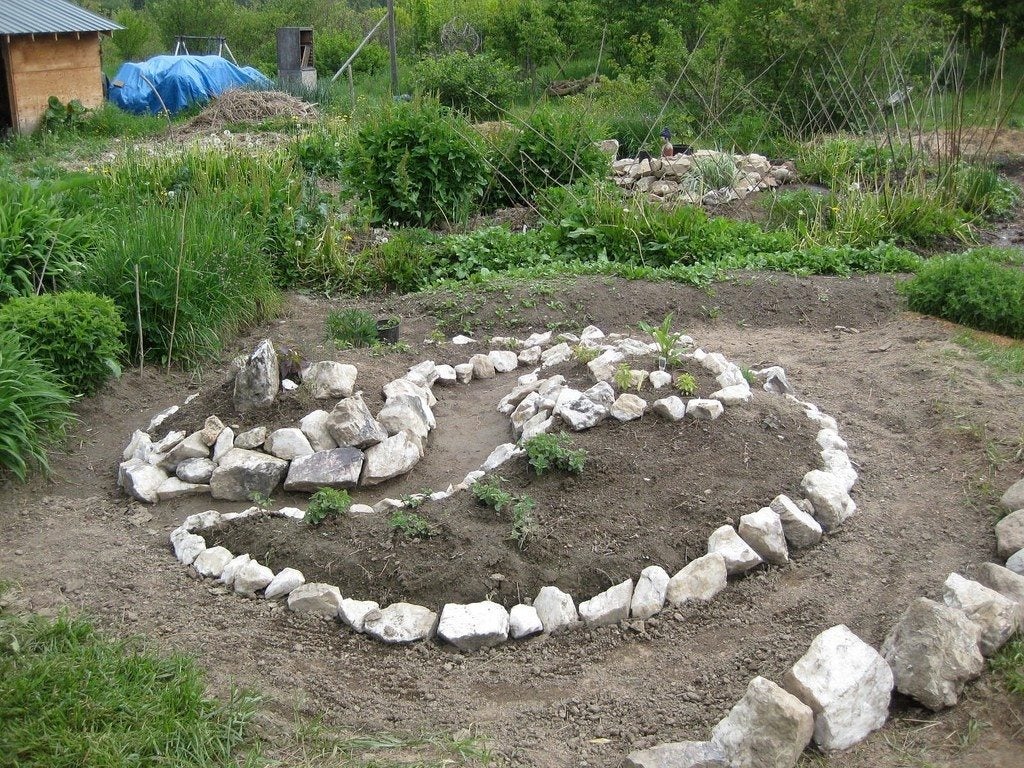
Sign up for the Gardening Know How newsletter today and receive a free copy of our e-book "How to Grow Delicious Tomatoes".
You are now subscribed
Your newsletter sign-up was successful
The spiral rock herb garden is an attractive and utilitarian design plucked straight from the natural world, despite its complex appearance. Let's learn about spiral herb garden ideas.
What is a Spiral Herb Garden?
A spiral herb garden is a sustainable garden design ideal in creating microclimates to suit a variety of herbs and their needs. Many of the herbs hail from Mediterranean climates and need dry, sandy soil conditions while others thrive in cooler, moister soils. A spiral herb design is warm and dry at the top and cools and retains moisture at the base. Additionally, it makes great use of a small amount of space. In a 6 by 6 foot (2 x 2 m.) area utilizing a spiral shape, 22 feet (7 m.) of plant space is available. A spiral herb garden is also easier to manage, plant, and harvest then other designs, allowing one to stand outside the circle and reach into the middle without trampling any of the herb babies. As an added bonus, a spiral herb garden can be constructed by using recycled or repurposed materials, making it cost effective; not to mention all the money you save harvesting your own fresh herbs instead of purchasing pricey store bought.
How to Grow a Spiral Herb Garden
For all the reasons mentioned above, I have no doubt that you are interested in learning how to grow a spiral herb garden. Construction is really fairly simple. Location is key; you will want the tail of the spiral end in a shaded area and the center or highest point to have more sun exposure. Once you figure out where you want to construct the spiral, mark it out on the ground with some small stones and then begin to build. Use repurposed, bartered, or recycled materials such as old brick, cinder blocks, or concrete chunks. Use your imagination. Begin to build a sturdy wall capable of holding in the filler material and soil. Begin at the center of the spiral and work your way out one tier at a time. Stagger space the bricks (or whatever you use) to add strength and remove three bricks or the equivalent from the end of each layer to create a spiral that goes from higher to lower. As the wall takes shape, gradually begin filling it in. A bottom layer of cardboard, layered with organic matter (compost bin contents) and good quality soil, or additional compost layered again with straw, also called lasagna gardening, will create a solid nutrient-rich backbone for the spiral herb garden. These components also assist in regulating soil temperature, retaining water, and retarding weeds. The lowest end of the spiral should be heavy on the compost for a richer soil great for parsley and chives. The middle zone should be two parts soil media to one part sand, perfect for growing herbs such as coriander and hyssop. Lastly, the top should have even more sand and some pea gravel to create the drier conditions needed for oregano, rosemary, lavender, and thyme.
Spiral Herb Garden Plants
In additional to a variety of herbs like those previously mentioned, some spiral herb garden ideas for plants include nasturtiums, blue borage, and violas. These flowers not only add beauty but are edible, attract pollinators, and repel insects. You may also wish to include strawberry plants, peppers, lemon grass, and garlic among your spiral herb garden plants, some of which may be basil, sage, and cilantro.
Sign up for the Gardening Know How newsletter today and receive a free copy of our e-book "How to Grow Delicious Tomatoes".

Amy Grant has been gardening for 30 years and writing for 15. A professional chef and caterer, Amy's area of expertise is culinary gardening.
